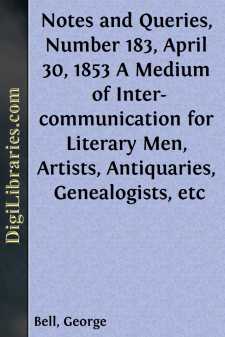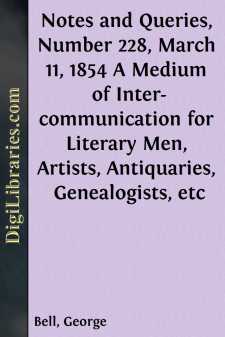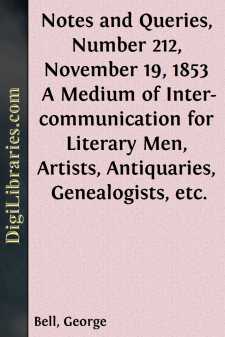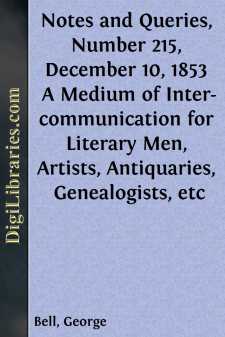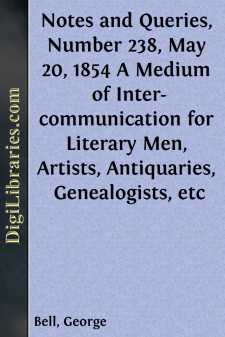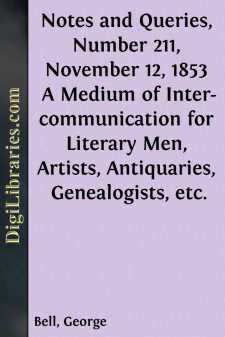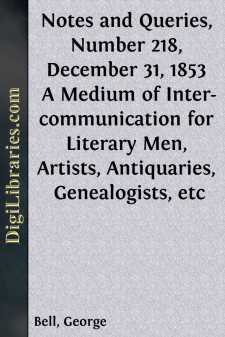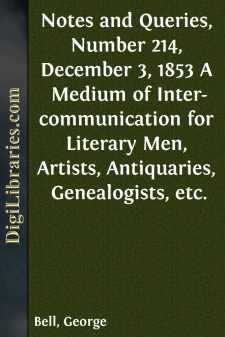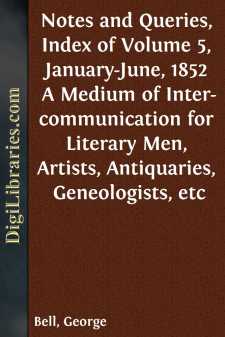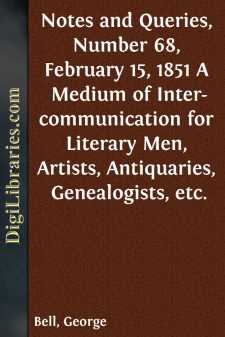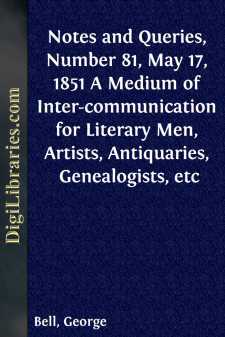Categories
- Antiques & Collectibles 13
- Architecture 36
- Art 48
- Bibles 22
- Biography & Autobiography 813
- Body, Mind & Spirit 142
- Business & Economics 28
- Children's Books 17
- Children's Fiction 14
- Computers 4
- Cooking 94
- Crafts & Hobbies 4
- Drama 346
- Education 46
- Family & Relationships 57
- Fiction 11829
- Games 19
- Gardening 17
- Health & Fitness 34
- History 1377
- House & Home 1
- Humor 147
- Juvenile Fiction 1873
- Juvenile Nonfiction 202
- Language Arts & Disciplines 88
- Law 16
- Literary Collections 686
- Literary Criticism 179
- Mathematics 13
- Medical 41
- Music 40
- Nature 179
- Non-Classifiable 1768
- Performing Arts 7
- Periodicals 1453
- Philosophy 64
- Photography 2
- Poetry 896
- Political Science 203
- Psychology 42
- Reference 154
- Religion 513
- Science 126
- Self-Help 84
- Social Science 81
- Sports & Recreation 34
- Study Aids 3
- Technology & Engineering 59
- Transportation 23
- Travel 463
- True Crime 29
Notes and Queries, Number 183, April 30, 1853 A Medium of Inter-communication for Literary Men, Artists, Antiquaries, Genealogists, etc
by: George Bell
Categories:
Description:
Excerpt
PROCLAMATION OF HENRY VIII. AGAINST THE POSSESSION OF RELIGIOUS BOOKS.
The progress of the Reformation in England must have been greatly affected by the extent to which the art of printing was brought to bear upon the popular mind. Before the charms of Anne Boleyn could have had much effect, or "doubts" had troubled the royal conscience, Wolsey had been compelled to forbid the introduction or printing of books and tracts calculated to increase the unsettled condition of the faith.
The following proclamation, now for the first time printed, may have originated in the ineffectual result of the cardinal's directions. The readers of Strype and Fox will see that the threats which both contain were no idle ones, and that men were indeed "corrected and punisshed for theyr contempte and disobedience, to the terrible example of other lyke trangressours."
The list of books prohibited by the order of 1526 contains all those mentioned by name in the present proclamation, except the Summary of Scripture; and it will be seen that such full, general terms are used that no obnoxious production could escape, if brought to light. The Revelation of Antichrist was written by Luther.
Strype does not seem to have been aware of the existence of this particular proclamation, which was issued in the year 1530. Under the year 1534 (Ecclesiastical Memorials, &c., Oxford, 1822, vol. i. part i. p. 253.), he thus refers to what he thought to be the first royal proclamation upon the subject:
"Much light was let in among the common people by the New Testament and other good books in English, which, for the most part being printed beyond sea, were by stealth brought into England, and dispersed here by well-disposed men. For the preventing the importation and using of these books, the king this year issued out a strict proclamation, by the petition of the clergy now met in Convocation, in the month of December.
"Nor was this the first time such books were prohibited to be brought in: for us small quantities of them were secretly conveyed into these parts from time to time, for the discovering, in that dark age, the gross papal innovations, as well in the doctrine of the Sacrament as in image-worship, addressing to saints, purgatory, pilgrimages, and the like.
"A previous order (in the year 1526) was issued by the Bishop of London, by the instigation of Cardinal Wolsey, calling in all English translations of the Scripture. And other books of this nature were then forbid."
This proclamation, therefore, well merits preservation in your pages, as one of the hitherto unknown "evidences" of the terrible and trying times to which it refers.
It shows, too, the value of the class of papers upon which the Society of Antiquaries are bestowing so much attention. The original was found among a miscellaneous collection in the Chapter House, Westminster.
Joseph Burtt.
A PROCLAMATION.
... nse Junii Anno regni metuendissimi Domini nostri Regis Henrici Octavi xxij.
A Proclamation, made and divysed by the Kyngis Highnes, with the advise of His Honorable Counsaile, for dampning of erronious bokes and heresies, and prohibitinge the havinge of Holy Scripture translated into the vulgar tonges of englische, frenche, or duche, in suche maner as within this proclamation is expressed....


